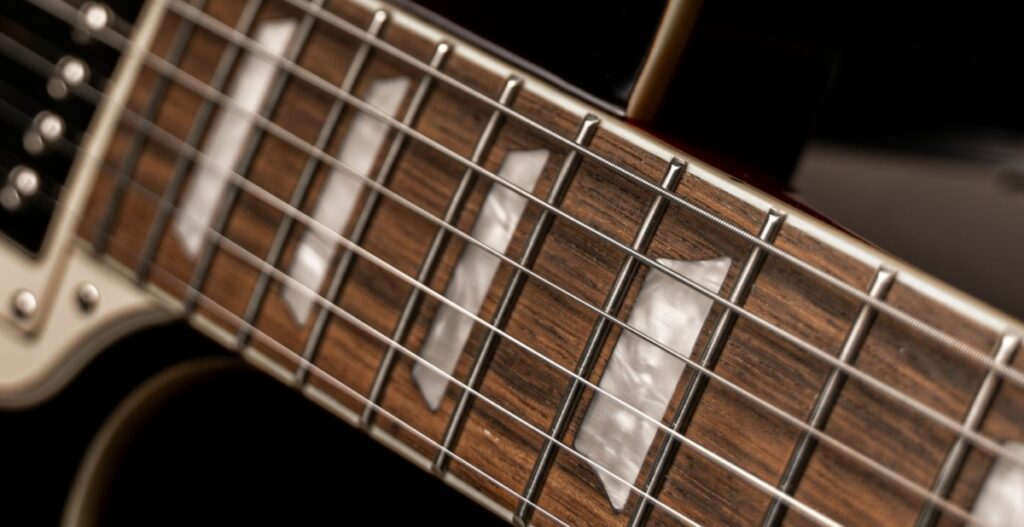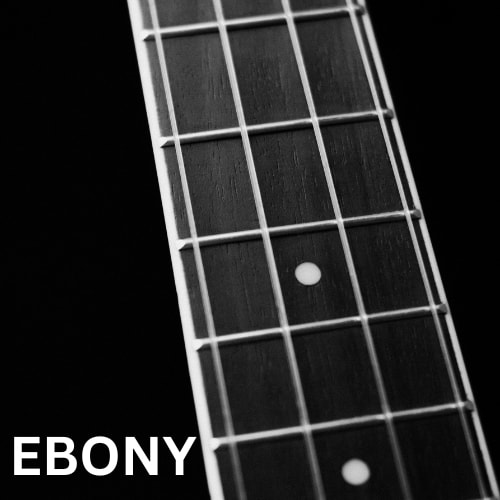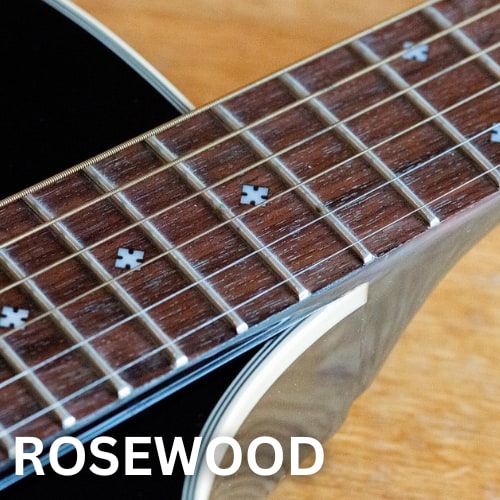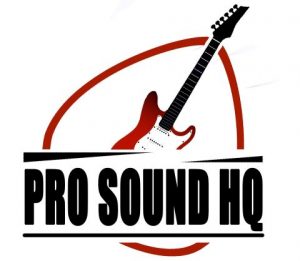Rosewood and ebony are two very popular choices for fretboards, but what’s the difference between them? I’ll be comparing the tone, feel, appearance and durability of ebony and rosewood fingerboards in this article so you can decide which is the best option for your guitar.
Rosewood vs Ebony Summary
Ebony fretboards feel smoother and harder, and look colder and darker in comparison to rosewood fretboards. In terms of the tone, ebony sounds brighter and more focused whereas rosewood has more sustain, however in reality the difference is very difficult to detect.
| Ebony Fretboard | Rosewood Fretboard |
| Dense and smooth feeling | Soft and rougher feeling |
| More hard-wearing | Less susceptible to environmental changes |
| Sound bright and focused | Sound more balanced |
| Dark and cold looking wood | Warmer and lighter looking wood |

Tone
Ebony is more dense compared to rosewood which is more porous. This causes them to sound slightly different from one another.
Ebony is known for having a bright and snappy tone due to its high density. Rosewood on the other hand sounds darker and offers slightly more warmth and sustain, since the vibrations have more space to move around in due to its porous nature.
How much the fingerboard material affects the overall tone of an electric guitar is a bit debate. It will have an impact if all other variables are kept the same, however in reality there are always other variables to consider when comparing two guitars.
The pickups, scale, and body wood have a much more significant impact on the tone of an electric guitar compared to the fretboard wood. You’re unlikely to notice a difference in tone between an ebony and rosewood fretboard in most cases.
Check out this YouTube video to hear a bass guitar comparison and see if you can tell the difference between ebony, rosewood and maple fretboards.
Feel
Ebony is a very hard wood and feels very smooth. It feels very nice and fast to play on, particularly compared to rosewood which feels softer. This is why ebony is often selected for “shred-style” guitars where being able to play very fast is essential.
Rosewood is quite a porous wood which means when you bend the strings, there is a bit more friction compared to ebony which isn’t as porous and has a smoother feel. However, some players prefer the softer feel of rosewood as it feels more gentle on the fingers.
Players with more experience are more likely to appreciate the feel of an ebony fingerboard. However, that doesn’t mean that advanced players will always prefer the feel of it. Like with most guitar specifications, it really varies from player to player.
Look
Ebony and rosewood are both dark woods, but ebony is close to black whereas rosewood definitely looks more brown. Ebony is a colder looking wood, whereas rosewood is warmer looking.
Ebony fretboards are a popular choice on darker electric guitars and looks amazing on guitars with a black body and neck. The contrast can be a bit too much on lighter colored guitars though, although it is all down to personal preference. Ebony fingerboards look particularly nice on guitars that use colder colors such as blue.
Rosewood guitars tends to suit a variety of body and neck colors and is a very popular choice on a range of electric guitars. Again, the contrast can be a little bit too dramatic for my taste on guitars with a very light body, but tends to look a bit better than ebony. The warmer tint on Rosewood really suits those warmer body colors such as red and orange.


Durability and Maintenance
Ebony is a harder wood compared to rosewood and is actually about 35% more dense by comparison.
- Ebony density = 1.10-1.30 g/cm3
- Rosewood density = 0.80-0.88 1g/cm3
This makes ebony more resistant to general wear and tear.
However, ebony is more susceptible to changes in humidity compared to rosewood. This means ebony fretboards are more likely to warp and require regular oiling to keep them in the best condition. Rosewood fretboards are a bit more low-maintenance since they are quite oily and porous by nature.
You should always be mindful about the where you store your guitar, as temperature and humidity changes are a real issue. However, rosewood fingerboards are more forgiving.
Which Guitars Have Ebony and Rosewood Fretboards?
Rosewood fretboards are more popular compared to ebony fretboards.
Rosewood fretboards are seen on a lot of high-end Fender and Gibson models. It is a premium wood that isn’t seen as much on lower-end guitars and is often replaced for the similar looking Pau Ferro. Ebony fretboards are seen on a lot of mid-high end guitars and is very popular in the metal scene and also on many hollow body guitars.
Guitars with Rosewood Fretboards:
- Fender American Original
- Fender American Performer
- Fender American Ultra
- Gibson Les Paul
- Gibson ES-335
- Gibson SG
- PRS Custom 24
- Epiphone Les Paul Custom
Guitars with Ebony Fretboards:
- PRS SE Hollowbody
- Epiphone Les Paul Modern
- Epiphone SG Modern
- Chapman ML1
- Schecter Sun Valley
- ESP EC-1000
- ESP MH-1000
- Fender Acoustasonic
Check out more fretboard wood comparisons:
